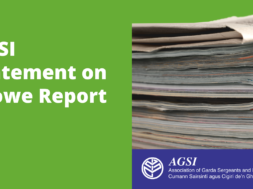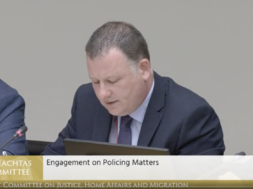Dáil Debate: The need for updated Garda Guidelines in cases of house, land or property repossessions
Check Against Delivery
Topical Issues Debate
21 April 2015
To ask the Minister for Justice the Garda guidelines in relation to house, land or property repossessions; if the Minister has any plans to review or change such guidelines as a result of recent repossession cases; and if she will make a statement on the matter.
Jack Wall T.D.
The need for updated Garda Guidelines in cases of house, land or property repossessions
Martin Heydon T.D.
Opening Remarks by Minister of State Aodhán Ó Ríordáin TD on behalf of the Minister for Justice and Equality, Frances Fitzgerald TD
I would like to thank the Deputies for raising this matter today. I am speaking on behalf of the Minister for Justice and Equality who regrets she is unable to be present for the debate due to other official commitments. I will of course bring the views of the Deputies to her attention.
Without wanting to comment on the specific circumstances of any particular case, the Minister is of course very much aware of the strain which can arise for individuals and their families when their personal or business finances become distressed. In these circumstances repossession of a home or other property inevitably brings those pressures to a head. All of us as public representatives have engaged with people struggling with these circumstances and it is undoubtedly one of the most tangible legacies of the national economic mismanagement which this Government has been grappling with.
As the Deputies will be aware this Government has put in place a broad strategy to address the problem of mortgage arrears and family home repossessions. This has included an extensive suite of interventions designed to address the problem including specific Central Bank targets for the banks through the Mortgage Arrears Resolution Targets (MART). In addition the Code of Conduct on Mortgage Arrears produced by the Central Bank sets out how mortgage lenders must treat borrowers in or facing mortgage arrears. We have also seen the extensive recasting of the personal insolvency legislation including establishment of the Insolvency Service of Ireland and introduction of the Personal Insolvency Agreement (PIA) Model. In addition we have enhanced the provision of advice through initiatives led by Department of Social Protection. Furthermore the mortgage to rent scheme has been put in place to assist borrowers who are in an unsustainable mortgage position to remain in their homes through the involvement of social housing agencies.
I should also call attention to the review of the insolvency legislation announced as part of the Statement of Government Priorities 2014-2016 . This involved consultations with all the relevant stakeholders and has been completed by the Department of Justice and Equality. Work is currently underway, across Government Departments, to develop a comprehensive and effective response to help those trapped in unsustainable debt to arrive at sustainable solutions. That work is expected to conclude shortly and the Government’s action plan in this area will be announced.
The Minister is conscious of the painful situations that have arisen for families and farm and business owners, a number of which have been raised specifically with her as Minister. As these cases are matters which have or are before the courts, it would not be appropriate for her to comment on their specifics.
In response to the issues raised by the Deputies concerning the need for Garda guidelines on repossessions, it is important to be very clear about the role and functions of members of An Garda Síochána in these circumstances.
The proceedings which give rise to repossessions are first and foremost civil proceedings in which the Gardaí are not a party. There may be situations where Gardaí become aware, or are notified, that property is to be the subject of enforcement proceedings on foot of a court order. In those circumstances it is an operational determination for Garda management to assess whether a Garda presence is advisable so as to prevent any risk of a breach of the peace. Preserving public order is an essential function of An Garda Síochána whether in circumstances relating to repossession or otherwise.
Where Gardaí do attend in those circumstances is equally important to be clear that they do not have a role in the repossession process itself, unless specific actions are directed to them by the Court, and are not in a position to act as an arbiter in the proceedings. There may be confusion on this point in the public mind but this is the legal position and the Gardaí are very clear about this when they are present in such circumstances. Issues of difference or difficulty concerning the enforcement of the order are matters for the parties to resolve before the courts.
Where a breach of the peace does occur there are of course provisions in public order and other legislation which then may apply. Similarly, where an individual has concerns that a criminal action may be have been committed by any person in the course of such proceedings, then this is a matter which An Garda Síochána will of course investigate.
Furthermore, if a person feels they have grounds for complaint about the actions of a member of An Garda Síochána in relation to this or any other matter this is something which can be pursued through a complaint to the Garda Síochána Ombudsman Commission.
I should add that the Minister has no function in relation to persons appointed to execute courts orders who are operating under the aegis of the courts.
In conclusion, the Minister would like to underline that, as a matter of general Government policy the effective management of the mortgage arrears challenges remains under continuous review. More and concerted action can be undertaken by the banks to assist customers in arrears and, as the Taoiseach has previously announced, the Government is considering a range of options to support the existing framework and to improve the uptake of personal insolvency solutions.
ENDS









